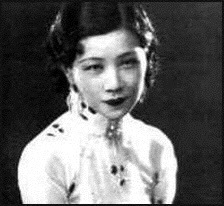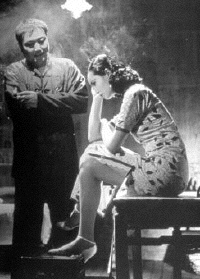
A forgotten Chinese star The Goddess was the first film of director Wu Yonggang: working on a tight budget he crafted a well photographed and acted tragedy. Ruan's un-named character is a single mother, forced by poverty into a life pf prostitution. Attracting the attention of a petty gang boss, she becomes his 'property': he steals her money and threatens her when she tries to escape. She enrols her young son in a school, but the other parents demand his removal because of her occupation. Trying to escape again, and discovering the gang boss has stolen the last of her money, she confronts him: he attempts to beat her and she retaliates with a bottle, killing him. Her son is adopted by the school Principal, who she tells never to reveal to him what has happened to her; she is sent to jail.  All
the actors are good - the gang boss in particular gives a convincingly genial
but menacing performance, and it's noticeable that all the acting is subtle and
realistic; Ruan's performance is luminous, with the gift of the great silent
stars of letting you see her thoughts with only the slightest expression, as the
character moves between the two worlds of love for her son and the cynical life
of prostitution. Despite the inevitable rough edges in the film (and its none
too good condition) it stands as an achievement of silent
cinema. All
the actors are good - the gang boss in particular gives a convincingly genial
but menacing performance, and it's noticeable that all the acting is subtle and
realistic; Ruan's performance is luminous, with the gift of the great silent
stars of letting you see her thoughts with only the slightest expression, as the
character moves between the two worlds of love for her son and the cynical life
of prostitution. Despite the inevitable rough edges in the film (and its none
too good condition) it stands as an achievement of silent
cinema.The film was shown here with a modern score composed by Kimho Ip a few years back, presented in a recording made at the score's premier. Effective in only a few places, much of it is not particularly suitable, and, oddly, there are long silent patches which gives a slightly unreal air to those sections of the film. Like the live performance of My Best Girl I wrote about last March, this demonstrates again that few modern composers have any idea how to write for silent films. This was Ruan Lingyu's finest film: she made only two more. In March 1935, hounded by the tabloid press and enmeshed in a lawsuit with her first husband, she took her own life. Posted: Sun - October 12, 2008 at 09:09 AM by Roger Wilmut |
Quick Links
About Me:
Roger Wilmut XML/RSS Feed
MY PODCAST
Archives
Calendar
Blogroll
WEBRINGS
Statistics
Total entries in this category: Published On: Mar 11, 2016 05:00 PM |
||||||||||||||||||


